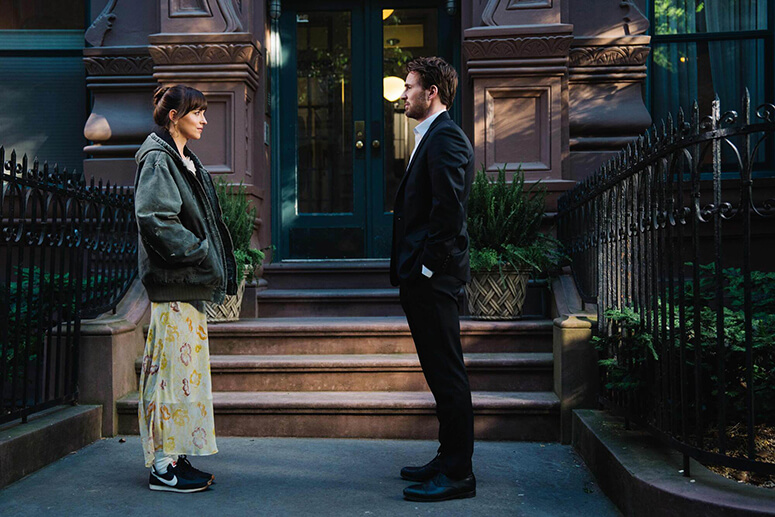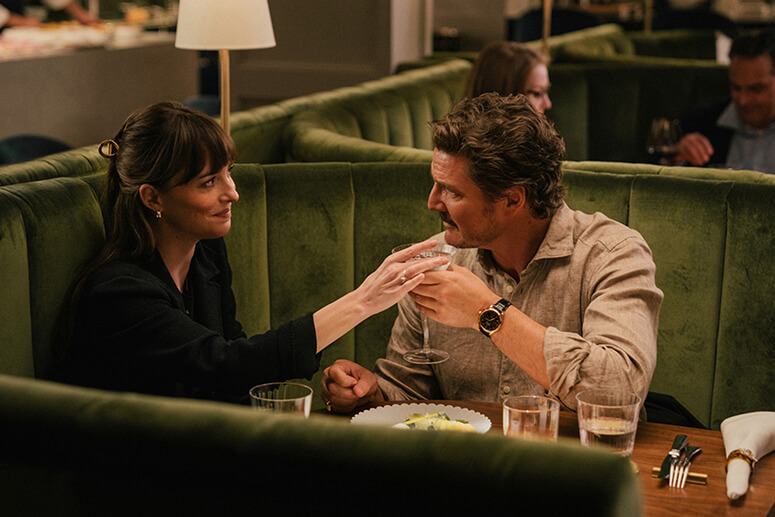The difficulties of the modern rom-com
Smart and charming. It’s a difficult combo for a rom-com to pull off. When you ascend the rom-com ladder above the mere fluff, the formulaic, the over-troped (which is, face it, most of them; it’s an industry), there are a few that stand out, managing to amuse us, make us think, and sweep viewers off their feet. A couple examples that really hold up: When Harry Met Sally (1989) still pulls you in with the effortless charm of its leads, its witty dialogue and age-old dilemma of how to go beyond being “friends.” Crazy, Stupid, Love (2011) has a preposterous plot twist, but it’s smart and oozes with charm.
Celine Song’s new film, Materialists, doesn’t really want to charm us. That’s its packaging, its subterfuge. Song—critically adored for Past Lives, that bittersweet look at missed opportunities, paths not taken in life and romance—wants to talk about other things here. Her main voice is Lucy (Dakota Johnson), a Manhattan matchmaker (are there still such things, in the age of Tinder and dating apps?) who is committed to the idea that marriages can be teased out with calculators and lists of sellable features. “It’s just math,” she says early on, with an enigmatic, bemused expression. Lucy has successfully matched up nine couples straight to the altar, which certainly merits a cake and champagne celebration at the company she works at, Adore. (So ’90s!)

Harry, the brother of her latest marital “mission accomplished,” sets down next to her at the singles table of the wedding reception, and he’s… Pedro Pascal, so you know the sparks will fly.
But Lucy resists. She sees through the sales pitches, because she’s designed that way. She’s a former actress who gave up on that dream, and on the guy she used to date, John (Chris Evans), who is still waiting tables, still doing catering, still taking off-Broadway theater roles, and generally starving in New York City. Their bad breakup (relayed in flashback) is like a beacon announcing that they will eventually be pulled back together. Still, she agrees to go on dates with Harry, at first to “gather data” so she can match him up with someone through Adore, but then for her own personal reasons.

Harry, on the other hand, is the modern-day “unicorn,” in Lucy’s parlance: he ticks all the boxes of being tall and handsome, sophisticated, thoughtful (presents her with loads of flowers on every date), and—very importantly—quite rich. Something must be wrong, Lucy thinks.
If this were a typical rom-com (and it’s not), there would be a scene where Harry is found out to be a no-good, double-dealing, lowdown cheatin’ dog. But this is Celine Song, and she doesn’t want to serve up a platter of obvious nothings. She’s way smarter than that. She wants to examine modern relationships, like in Past Lives. Thus, her dialogue is probing, incisive, even as the story comes to resemble the tropes of Sex and the City, but without its side-splitting farcical moments. She appropriates the formulae of rom-coms, while simultaneously trying to deconstruct them, and perhaps transcend them. (My thought experiment was this: if my mother-in-law, who loves Hallmark movies and demands rom-coms endlessly, were to watch Materialists with the sound off, she would find the actors charming, good-looking; she’d fall in love with the look of the film. But if she heard their conversations, she’d be confused. Because what they say is meant to make you think.)

It’s always iffy when a filmmaker like Song follows up a critically loved work with a Hollywood crossover, and her second film doesn’t fully escape the tropes it seeks to transcend. We want to fall in love with Materialists, because, let’s face it, they’re Hollywood actors and they look good onscreen. They exude charm as actors, but the film itself has a charm deficit. It focuses relentlessly on “market value,” one’s “worth” and feeling “valuable.” These sound like economic terms, even as they’re used here in the context of relationships (a point that Lucy makes, describing marriages as essentially, property contracts; she says this because she’s “clear-eyed,” not cynical).
You see, Lucy has the spook about her. Something to do with not wanting to be poor in New York City. It makes her a tough customer when it comes to love. She wants to see bank statements. Puts those cards on the table.
Song has her own thought experiment here. She asserts that any person—say, Lucy—can sift through all the data and facts of what is called, in movies, “love” and, disregarding all the evidence, listen to her heart. In that way, Materialists—even with an attractive cast who address difficult questions about relationships—lands on answers that seem as familiar as any ’80s romcom set in Manhattan.
Is that bad? No, as I said, the film resembles, in many of its external features, a comfortable rom-com structure. It just wants to make you think a lot more, and ponder all the perils of modern dating—the cold sifting and weighing of features of another human being, the dangers of hooking up with strangers—and still land on something that feels like Hollywood. It’s not a perfect landing.
As I said, smarts and charm is hard to pull off. Maybe charm—hard to measure, impossible to bottle—is as ineffable a quality as love.
* * *
Materialists opens Aug. 6. Released by Columbia Pictures.


